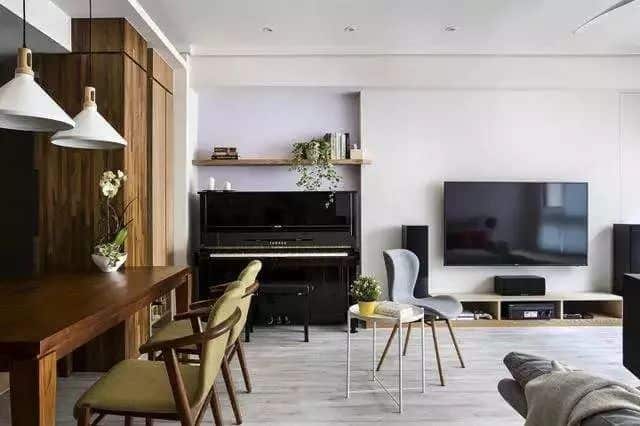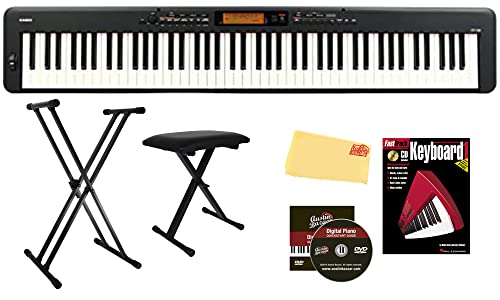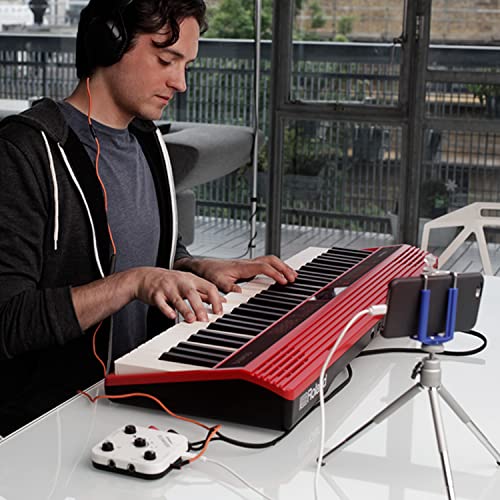
Finding a suitable piano can be challenging when it comes to limited space. This is where a Piano for a Small Space comes in handy, as it allows you to enjoy playing the piano in a compact size. The best Piano for Small Spaces offers the convenience of a full-sized piano while taking up minimal space, making it perfect for small apartments or rooms.
Finding the best Piano for a Small Space can be daunting, as many options are available. The size, sound quality, and piano features are all important considerations when deciding. Additionally, your personal preferences and budget will affect your decision-making process.
Fortunately, we have reviewed many Piano for Small Space options and can help you choose one that suits your needs. By considering factors such as size, sound quality, and features, we can help you find a piano that fits your space and offers excellent performance.
Contents
- 5 Best Piano for Small Space
- Casio CDP-S360 88-Key Compact Digital Piano Bundle
- Casio CT-X700 61-Key Portable Keyboard
- Roland GO:KEYS 61-key Music Creation Piano Keyboard
- Korg EK50 61-Key Keyboards & Pianos
- Alesis Prestige Artist – 88 Key Digital Piano
- How To Choose The Best Piano for a Small Space
- Frequently Asked Questions About Piano for Small Space
- 1. What is a piano for a small space?
- 2. How is a piano for a small space different from a regular piano?
- 3. Are pianos for small spaces suitable for beginners?
- 4. What are the main features to consider when buying a piano for a small space?
- 5. Can a piano for a small space be as good as a regular piano?
- 6. How do I care for my piano in a small space?
- 7. Are piano lessons different for a piano in a small space?
- 8. Can I use headphones with a piano for a small space?
5 Best Piano for Small Space
Casio CDP-S360 88-Key Compact Digital Piano Bundle
Casio CDP-S360 is a standout choice as the Best Piano for Small Spaces due to its compact design without compromising quality.

 This piano is designed to fit seamlessly into tight spaces while offering an authentic piano experience. Its portability and slim profile make it perfect for small apartments or rooms with limited space.
This piano is designed to fit seamlessly into tight spaces while offering an authentic piano experience. Its portability and slim profile make it perfect for small apartments or rooms with limited space.
Weighted Hammer Action Keys: The CDP-S360 features weighted hammer-action keys, providing a true piano-playing feel. This allows users to practice with the same touch and response as an acoustic piano, enhancing their playing skills and expression.
Versatile Sound Engine: With a wide range of built-in sounds, including various piano tones, strings, and more, users can explore and experiment with different musical styles. This versatility makes it an excellent choice for beginners and advanced players.
Bluetooth Connectivity: The piano’s Bluetooth capability allows users to connect to educational apps or music software, making learning and playing more engaging and interactive.
In summary, the Casio CDP-S360 is ideal for small space living and caters to beginners and experienced musicians. Its weighted keys, versatile sound engine, and Bluetooth connectivity enhance the playing experience. It’s a recommended choice for those looking for a space-saving digital piano.
Pros:
- Compact design
- Authentic weighted keys
- Versatile sound options
- Bluetooth connectivity
- Suitable for beginners and pros
Cons:
- Limited built-in songs
- Speaker quality could be better
Casio CT-X700 61-Key Portable Keyboard
The Casio CTK-X700 earns its spot as one of the Best Pianos for Small Spaces due to its compact size and impressive features. Its sleek design and lightweight build make it perfect for those with limited space, whether in a small apartment or a dorm room.
 Diverse Sound Library: The CTK-X700 boasts a wide range of built-in tones, from classic pianos to various instruments. This diversity allows users to explore different musical genres and experiment with their creativity.
Diverse Sound Library: The CTK-X700 boasts a wide range of built-in tones, from classic pianos to various instruments. This diversity allows users to explore different musical genres and experiment with their creativity.
Step-Up Lesson System: This feature is a blessing for beginners. The step-up lesson system guides learners through the basics of playing, helping them build their skills progressively. It’s an excellent tool for those starting their piano journey.
Touch-Sensitive Keys: The keyboard’s touch-sensitive keys respond to your playing dynamics, enabling more expressive performances. This function adds depth and emotion to your music.
The Casio CTK-X700 is ideal for small spaces and caters to beginners and intermediate players. Its diverse sound library, step-up lesson system, and touch-sensitive keys make it a great choice.
Pros:
- Compact and lightweight
- Diverse sound library
- Step-up lesson system
- Touch-sensitive keys
- Affordable price
Cons:
- Limited for advanced players
- Speaker quality could be better
Roland GO:KEYS 61-key Music Creation Piano Keyboard
The Roland GO: KEYS stands out as one of the Best Pianos for Small Spaces due to its portability and innovative features.
 Its compact size and battery-powered option make it perfect for on-the-go musicians and small living spaces.
Its compact size and battery-powered option make it perfect for on-the-go musicians and small living spaces.
Loop Mix Function: The GO: KEYS features a unique loop mix function that allows users to create songs easily. It’s a fantastic tool for songwriters and composers who want to sketch out musical ideas quickly.
Bluetooth Connectivity: This keyboard’s Bluetooth capability enables wireless connection to music apps and external devices. Musicians can jam along with their favorite tracks or use educational apps for learning.
Compact and Portable: Weighing just over 8 pounds, the GO: KEYS is incredibly portable. You can take it to gigs, practice sessions, or even outdoors. Its versatility is a significant advantage for mobile musicians.
In conclusion, the Roland GO: KEYS is a perfect fit for those in small spaces or frequently on the move. Its loop mix function, Bluetooth connectivity, and portability make it valuable.
Pros:
- Loop mix function for creativity
- Bluetooth connectivity
- Ultra-portable design
- Battery-powered option
- Ideal for songwriters
Cons:
- Limited sound variety
- Smaller keyboard range
Korg EK50 61-Key Keyboards & Pianos
The Korg EK-50 secures its place among the Best Pianos for Small Spaces with its comprehensive features and compact design. It caters to many users, from beginners to experienced musicians.
Extensive Sound Selection: The EK-50 offers various sounds, including high-quality pianos and instrumental tones. Users can explore different musical styles and experiment with their creativity.
Auto-Accompaniment Styles: This keyboard’s auto-accompaniment styles provide a full band experience. Musicians can play with automatic accompaniment, making it suitable for live performances and jam sessions.
User-Friendly Interface: The EK-50’s intuitive interface makes it easy for beginners and experienced players to navigate and customize their settings.
The Korg EK-50 is an all-in-one solution for musicians in small spaces. Its extensive sound selection, auto-accompaniment styles, and user-friendly interface make it a valuable choice.
Pros:
- Extensive sound selection
- Auto-accompaniment styles
- User-friendly interface
- Suitable for live performances
- Versatile for all skill levels
Cons:
- Heavier compared to some competitors
- The price may be a bit higher
Alesis Prestige Artist – 88 Key Digital Piano
The Alesis Prestige Artist earns its place as one of the Best Pianos for Small Spaces by combining outstanding performance with a compact design, making it perfect for those with limited room.
High-Resolution Sound Engine: Alesis Prestige Artist boasts a high-resolution sound engine that delivers realistic and expressive piano tones. Users can enjoy the nuances of acoustic piano sound, enhancing their musical experience.
Responsive Touch-Sensitive Keys: The touch-sensitive keys respond to the user’s playing dynamics, allowing for more expressive performances. This feature is particularly beneficial for pianists looking to refine their skills.
Built-In Lesson Mode: The piano features a built-in lesson mode that aids beginners in learning and practicing. It’s a valuable tool for those starting their piano journey.
In conclusion, Alesis Prestige Artist is an excellent choice for small spaces, offering high-resolution sound, responsive keys, and built-in learning features. It’s recommended for both beginners and experienced players.
Pros:
- Realistic sound quality
- Responsive touch-sensitive keys
- Built-in lesson mode
- Compact design
- Suitable for all skill levels
Cons:
- Limited sound variety
- The speaker volume could be louder
How To Choose The Best Piano for a Small Space
Finding the right piano for a small space can be a challenging task. There are many factors to consider, including size, sound quality, and price. This article will guide you through selecting the best piano for small spaces.
1. Size and Weight
The first thing to consider when selecting a piano for small spaces is its size and weight. You must measure your available space and ensure the piano fits in that area. Additionally, it would be best if you ensured the piano was lightweight enough to move around quickly.
2. Sound Quality
The sound quality of a piano is a crucial factor to consider. You want a piano to produce a rich, full sound that fills your space. Make sure to test the piano’s sound quality before making a purchase.
3. Key Action
A piano’s key action refers to the keys’ touch and feel when played. You want a piano with a responsive and consistent key action. This will allow you to play with accuracy and expressiveness.
4. Number of Keys
The standard number of keys on a piano is 88. However, you may want to consider a smaller keyboard if you are short on space. The number of keys you choose will depend on your skill level and the type of music you play.
5. Brand and Reputation
Choosing a reputable brand with a good reputation in the market is essential when selecting a piano for small spaces. You want a piano built to last and has a proven track record of reliability.
6. Price
The price of a piano is an important consideration. You want to select a piano that is within your budget while meeting your needs.
7. Digital vs. Acoustic
When selecting a piano for small spaces, you must decide whether you want a digital or acoustic piano. Digital pianos are usually smaller and more affordable than acoustic pianos, making them a popular choice for small spaces.
8. Additional Features
Finally, consider any additional features that you may want in your piano. For example, some digital pianos have built-in speakers or headphone jacks, while others have recording capabilities.
In conclusion, selecting the best piano for small spaces requires careful consideration of several factors. You can find the right piano that fits your needs and space by considering the size and weight, sound quality, essential action, number of keys, brand reputation, price, digital vs. acoustic, and additional features.
Frequently Asked Questions About Piano for Small Space
If you have limited space in your home but still want to enjoy playing the piano, a piano for a small space could be the perfect solution. However, you may have some questions about this type of instrument. In this article, we will answer some frequently asked questions about pianos for small spaces.
1. What is a piano for a small space?
A piano for small spaces is a compact piano designed to fit tight spaces. These pianos have a smaller footprint than traditional pianos, making them ideal for apartments, studios, and other small living spaces.
2. How is a piano for a small space different from a regular piano?
A piano for a small space is smaller than a regular piano. These pianos usually have fewer keys and a more compact design to fit in smaller rooms. They can also be electric or digital, meaning they can be played with headphones, making them great for practicing without disturbing others.
3. Are pianos for small spaces suitable for beginners?
Yes, pianos for small spaces are suitable for beginners. They are often less expensive than traditional pianos and can be a great way to start learning how to play the piano. Additionally, their compact size makes them easier to move around and store.
4. What are the main features to consider when buying a piano for a small space?
The main features to consider when buying a piano for a small space include size, weight, sound quality, number of keys, and type. You will want to find a piano that is easy to move around, fits in your space, and produces high-quality sound.
5. Can a piano for a small space be as good as a regular piano?
Yes, a piano for a small space can be just as good as a regular piano. Many of these pianos are designed to replicate the sound and feel of a traditional piano. Some even have weighted keys to mimic the feel of an acoustic piano.
6. How do I care for my piano in a small space?
To care for your piano in a small space, keep it clean and dust-free. You should also avoid placing it in direct sunlight or near heat sources. It is also important to keep it in tune to ensure the best sound quality.
7. Are piano lessons different for a piano in a small space?
No, piano lessons are not different for a piano in a small space. The fundamentals of playing the piano are the same regardless of the type of piano you are playing.
8. Can I use headphones with a piano for a small space?
Yes, many pianos for small spaces come equipped with headphone jacks, allowing you to practice without disturbing others.
In conclusion, a piano for a small space can be an excellent investment for those who want to play the piano but have limited space. By considering the size, weight, sound quality, and other essential features, you can find the perfect piano for your needs.


